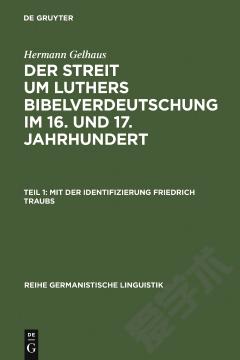Geschlechterdifferenz Im Denken Friedrich Schleiermachers
This first comprehensive study of friedrich schleiermacher´s work from the perspective of gender theory examines the development of his thought with regard to the gender debate of his time. the study takes the position that schleiermacher´s concept of the egalitarian complementarity of genders is of fundamental significance for his philosophical ethics as well as for his theology. the analysis of central texts from schleiermacher´s work demonstrates how his concept of gender influences his anthropology and his theology of marriage and how the linking of this gender concept and his theory of religion leads to a feminine coding of the religious which makes schleiermacher the theoretical precursor of a feminisation of religion in the context of the 19th century bourgeois gender order.
{{comment.content}}








 京公网安备 11010802027623号
京公网安备 11010802027623号